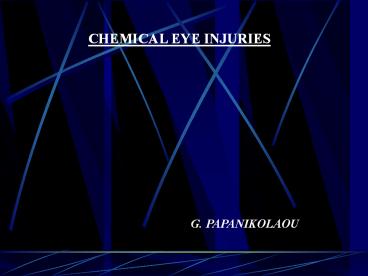CHEMICAL EYE INJURIES - PowerPoint PPT Presentation
Title:
CHEMICAL EYE INJURIES
Description:
CHEMICAL EYE INJURIES G. PAPANIKOLAOU EPIDEMIOLOGY 2/3 at work, young, males Alkali:acid=2:1 Alkali: NH3, NaOH, Ca(OH)2, KOH, MgOH2 Acid: H2SO4, HF, Acetic, HCl ... – PowerPoint PPT presentation
Number of Views:1665
Avg rating:3.0/5.0
Title: CHEMICAL EYE INJURIES
1
CHEMICAL EYE INJURIES
G. PAPANIKOLAOU
2
EPIDEMIOLOGY
2/3 at work, young, males Alkaliacid21 Alkali
NH3, NaOH, Ca(OH)2, KOH, MgOH2 Acid H2SO4, HF,
Acetic, HCl
- Damage depends on
- pH
- area
- Volume/duration
- Inherent toxicity
3
PATHOPHYSIOLOGY
ACID ALKALI
Denaturation precipitation of proteins on contact/ ground glass appearance Barrier to penetration Damage to stromal matrix secondary to inflammation Saponification of fatty acids in cell membranes Rapid penetration Damage to deeper structures
- Direct effect
- Indirect effect (inflammation)
4
PATHOPHYSIOLOGY II
- POINTS IN CORNEAL HEALING
- Epithelium regulates keratocytes, prevents
sterile ulceration - TGF-beta 2 inhibits collagenase synthesis by
keratocytes - Limbal vessels provide collagenase inhibitors
- Stem cells centripetal healing
- Transdifferentiation/ conjuctivalization
- Stroma type I collagen (keratocytes)
- Steroids intervene with keratocyte migration/
synthesis - Ascorbate co- factor in collagen synthesis
- MMPs increase after 10th day
- PMN 12-24h and 14-21days
5
PATHOPHYSIOLOGY III
- PHASES
- Immediate
- Acute (0-7)
- Early repair (7-21)
- Late repair (gt21)
6
GRADING
- Corneal clarity
- Limbal ischaemia
Grade Signs Prognosis
1 Clear/no excellent
2 Visible iris details/ lt1/3 good
3 Hazy iris view/ 1/3ltxlt1/2 guarded
4 Opaque/ gt1/2 poor
7
(No Transcript)
8
(No Transcript)
9
(No Transcript)
10
ACUTE MANAGEMENT
EMERGENCY !!!
- AIMS
- Remove offending agent/ stop further damage
- Reduce inflammation
- Control IOP
- Reduce matrix degradation
- Promote reepithelization
11
MANAGEMENT I
- Irrigation
- Eversion of lids
- Debridement
- A/C Paracentesis
Grade I and II steroid, antibiotic, cycloplegia
for 1/52.
12
TIPS
- Recheck pH 5-10 min after irrigation
- White eye worse than red
- Complete epith defects or if only Bowmans delay
in taking up FLN Repeat - Avoid PHNL
13
MANAGEMENT II
- Steroids/ up to10/7, NSAIDS
- Antibiotics
- Vit-C/ early
- Citric acid/ Ca chelation/ early
- Tetracyclines/ chelate zinc
- Acetylcysteine/ MMP
- Artificial tears
- BCL
- Tarsoraphy
- IOP control
14
MANAGEMENT III
- Tenoplasty/ early in grade IV (limb.
Vascularity) - Stem cell transplant (auto/allo)/ early or late
- Amniotic membrane graft
- Conjuctival/ mucosal grafts
- Correct lid malposition
- Fornix reconstruction
- Dry eye
- Glaucoma, Cataract
- Cyanoacrylate glue, tectonic PTK
- PTK (large), Keratoprosthesis
15
COMPLICATIONS
- Non-healing epith defect/ conjuctivalization/
melting (stem) - Corneal opacities
- Cataract
- Glaucoma/ phthisis
- Dry eye
- Lid malposition/ symblepharon/ trichiasis more
scarring
16
(No Transcript)
17
(No Transcript)
18
(No Transcript)































